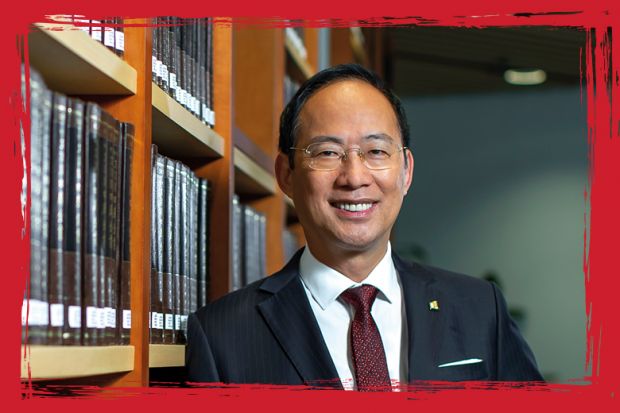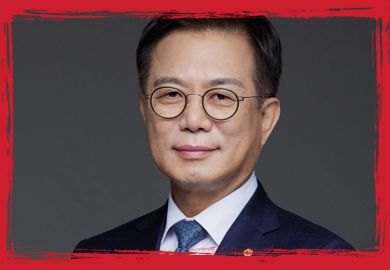When Alexander Ping-kong Wai was a PhD student, his supervisor had “what some would call a midlife crisis”: he left academia and started a business. He tried to recruit Wai to his burgeoning artificial intelligence company, but Wai was committed to physics. Later, he realised his commitment was misplaced.
The president and vice-chancellor has spent his three years at the helm of Hong Kong Baptist University (HKBU) trying to instil an adaptive mindset in students and staff. He wants them to be prepared for the rapidly changing jobs market and not to believe that they must stick to their original subject, as he did.
People frequently put themselves in a box too early, he believes – then, if they don’t achieve in that area, they deem themselves failures.
“Our students really need to realise that perhaps the job that they angle for when they enter university now, this year, might disappear when they graduate,” he says.
“We need to change their outlook so they don’t think, ‘I’m an arts student; I don’t need to know anything about technology’,” he adds.
Their university education might not be relevant for their whole working lives, so the role of a university is to prepare their mindsets to be ready for change, he believes, especially since generative artificial intelligence has blown up the jobs market. “How are we able to educate them to face this new reality? I think that’s the challenge we face.”
When he first started at HKBU with the goal of future-proofing education and students, Wai asked his senior team to forget about what they were good at and instead focus on what they thought society would need in five, 10 or even 15 years’ time. His colleagues warned that the structure of the institution did not allow for that shift; Wai said: “Let’s cross that bridge when we get there.”
The outcome was the establishment of four transdisciplinary courses, which aim to provide students with the skills to tackle changes to the jobs market. (Wai prefers “transdisciplinary” to “interdisciplinary” because “inter” implies that there are still two very distinct areas, whereas “trans” implies “information transformation”.)
One such course is on the technology of art. As art and technology subjects were scattered across different departments, he first had to reorganise departments. Then he built what was at the time, he claims, the world’s largest 360-degree LCD screen. This has enabled research that he thinks could give the museum sector a much-needed shake-up: “A little artefact behind a glass panel, a little metal plaque that you look at – you don’t get much out of it,” according to Wai.
Another transdisciplinary course covers innovation in health and society. Again, he’s brought in technology to assist the research: a functional MRI machine is now available to historians and social scientists. This type of equipment is common in medical labs, but Wai wanted scholars in other fields to have access to it.
“Brain research is a big deal nowadays,” he says. “Everywhere you look, people are doing something about the brain.”
One example of how it will be used is a project looking at the impact on under-privileged children of learning musical instruments – a type of theory that would usually be tested using surveys or focus groups. There is evidence from other countries that musical instruments are extremely beneficial, so this research will assess if they have the same impact in Hong Kong.
If the theory is proved, Wai says, they will try to influence policy in Hong Kong to benefit children. And if that works well, they will try to influence mainland China, “a country with one-fifth of the world’s population”.
Accepting change himself
While Wai wasn't persuaded by his supervisor to leave academia, the conversation stuck with him.
“He gave me a speech that changed my life. Not right away – I didn’t believe him at that time. But later on what he told me really affected me. He said to me: ‘Alex, when you think about it, what you are interested in is problem-solving – the satisfaction of having a problem solved. And there’s a lot more problems than just physics.’”
Later, he realised this was right. “Physics is enjoyable because it’s very clean. You think something will work and it does. This is very fun…But there are a lot more problems that can also be more challenging and give you a lot of satisfaction once you solve them.
“I did a lot of soul searching. I realised there were all these constraints I was putting on myself,” Wai says. “When I embraced the change, I was very happy.”
With this new outlook, when he returned to Hong Kong after studying and working at the University of Maryland in the US and the chance to become a department head came up, he thought: “Why not? Solving human management problems is much more difficult and challenging than problems in the physics lab.”
Demographic shifts
One of the biggest problems facing universities and wider society in Hong Kong is demographic change. The average age across the world is 30, but in Hong Kong it is 45. What does this mean for higher education? More competition for students, Wai says. Hong Kong is now very much part of the “global talent crunch”.
“Everyone now realises that education is important, that smart people like engineers will change the future,” he says, and so many countries are investing a lot in higher education and trying to retain their best and brightest. Wai outlines an experience he had in India, as part of a delegation there to recruit researchers. At some universities the delegation visited, the guests were not even allowed to speak to the students in case they tempted them away from India. “There’s quite fierce competition nowadays to retain the best students.”
Another part of the solution is letting in more international students. “Hong Kong is still attractive. It’s a modern city,” Wai says. However, this does not solve the problem for Hong Kong more broadly, because international students often leave once they graduate.
Among other countries facing a drop in the student-age population, some are worried that the need to retain numbers will cause standards to fall. “Statistically, this has already happened,” Wai says. When he attended university, there were 2,200 undergraduate places in Hong Kong. Now there are 15,000.
“Assuming the intelligence of the population has stayed the same, we are cutting the curve much wider now,” he says. “Lots of people talk about the lowering of the standards of higher education in Hong Kong. That’s not because our education system is bad; it’s because we’re letting in more students.” But, for him, widening access can never be a bad thing.
Hong Kong has not got to the point where everyone who wants to go to university can, he says, but it is getting close. “As an educator, of course it's a good thing. Education really changes a life.”
This is part of our “Talking leadership” series with the people running the world’s top universities about how they solve common strategic issues and implement change. Follow the series here.
Browse the full results of the Asia University Rankings 2024.
Register to continue
Why register?
- Registration is free and only takes a moment
- Once registered, you can read 3 articles a month
- Sign up for our newsletter
Subscribe
Or subscribe for unlimited access to:
- Unlimited access to news, views, insights & reviews
- Digital editions
- Digital access to THE’s university and college rankings analysis
Already registered or a current subscriber?




